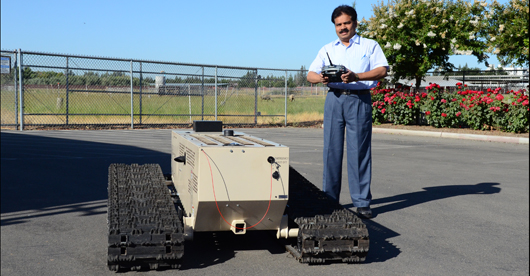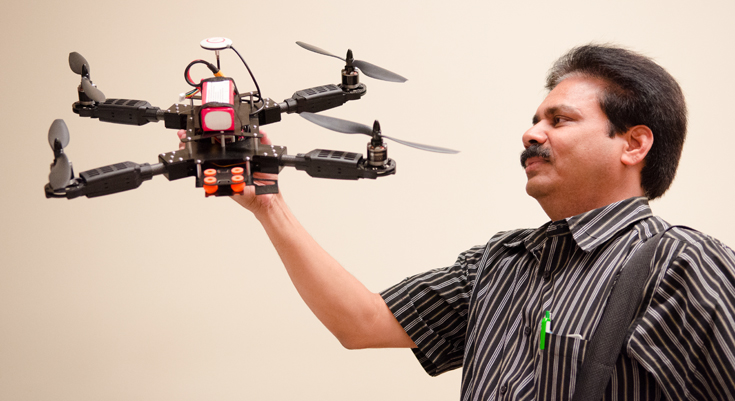California Agricultural Technology Institute
Department of Defense Grant

Fresno State Industrial Technology Professor Prem Mahalik test drives a new Zomby outdoor track vehicle. The flat top bed allows for attachment of various types of devices – camera, weather station, mechanical arm, etc.
Half-million dollar Department of Defense grant will bolster research, education in GIS/GPS technologies
A Fresno State Industrial Technology professor has been awarded nearly $500,000 in funding from the U.S. Department of Defense (DOD) to develop new applications of Geographical Information Systems (GIS) and Geographic Positioning Systems (GPS) technologies.
The work will have wide-ranging application, with the Defense Department’s primary interest being military uses. Part of the funding will go toward research using unmanned aerial vehicles (UAVs) and mobile robots – technologies that also can be used in agriculture.
“The project will establish a unique and integrated test bed for conducting high-class research in GPS-integrated hybrid sensing, surveillance, and navigation systems,” stated Professor Prem Mahalik, who will oversee the work.
Mahalik was notified of the grant award earlier this year; the funding was based on a competitive Call for Proposals from the U.S. Department of Defense at the national level.
The grant has funded the acquisition of 16 pieces of equipment, including six Pioneer AT3 indoor mobile robots, five Viking RTX quadcopters, two CropCam MP2022 drones, a Seekur outdoor ground vehicle, and a Zomby outdoor track vehicle powered by a Honda four-cylinder gas engine. All the vehicles are either UAVs (unmanned aerial vehicles) or UGVs (unmanned ground vehicles) that can be programmed and operated by radio communications.

Professor Mahalik displays a battery-powered Viking RTX quadcopter.
The equipment will enable research dedicated to new sensing, surveillance and navigation systems development, and will support creation of new university courses introducing students to precision mapping and navigation technology.
“The equipment and instrumentation will augment existing education and research capabilities at Fresno State,” Mahalik stated. The work will be embedded within Fresno State’s STEM program, a multidisciplinary approach to education emphasizing science, technology, engineering, and mathematics. “This will be a true multi- as well as inter- disciplinary approach that we have long been discussing,” he added.
The DOD’s central aim is to develop enhanced communication systems that can be employed in a battlefield environment, Mahalik said.
“GPS signals currently are not guaranteed at every geographic location because of multipath interference, jamming and other factors. In this research we will develop and test a hybrid GPS-integrated local Wireless Sensor Network (WSN) model that will validate the location of an agent, such as a soldier, warship or tank, and enable communication between them in a battlefield environment.”
This innovative integration for battle space awareness through a new “Cooperative Engagement System” will be central to research findings, he said.
The agricultural component of the grant supports enhancement of technologies that can be used in the farm field as well as the battlefield. Called “crop scouting,” these systems feature the use of unmanned aerial vehicles (UAVs, or drones) and mobile robots to gather visual information and perform specialized tasks.
“Our research and project tasks for this area include yield mapping, plant health monitoring, canopy management, crop security, weed monitoring, pesticide spraying, tree fruit harvesting, soil sampling and mapping, and data management and presentation” Mahalik said.
The instruments and equipment will be used to conduct two types of research: fundamental and applied. Fundamental research will embody development of new and innovative error compensation algorithms utilizing fundamental techniques and methods that can be used for next generation sensing, navigation, and surveillance technologies.
Besides working with faculty in the department of Industrial Technology, Mahalik will collaborate with faculty and researchers in other Fresno State departments such as Plant Science, Viticulture and Enology, Civil Engineering, Electrical Engineering, Mechanical Engineering, Computer Science and Geography. He also will partner with South Korea University in the areas of application of robotics in agriculture and wireless sensor networks in the military. He will explore opportunities for technology transfer, student exchanges, and joint research publications.
A second agricultural component of the grant will support development of frost control technologies, Mahalik said. Research topics will include valve control, remote monitoring, uniform water distribution, soil moisture measurement and electronic interface design, among others.
The DOD grant award marks a step upward in Fresno State’s capability to conduct sophisticated research and to partner with regional industries in development of communications technology. Mahalik anticipates that industry groups will step forward to partner in the project, supporting student research through internships and other programs.
“This funding will serve as a critical startup for a sustainable research and education program,” Mahalik said. “We will secure additional funding from other government and non-profit organizations as well as initiate fund-raising activities to enhance community involvement in this area.”
For more information on partnership opportunities in this work, contact Mahalik at nmahalik@csufresno.edu.